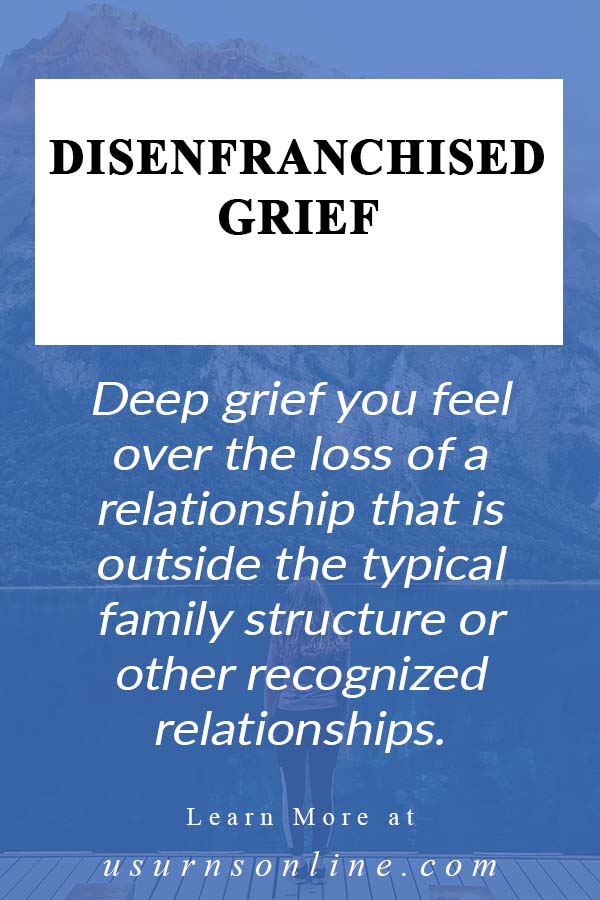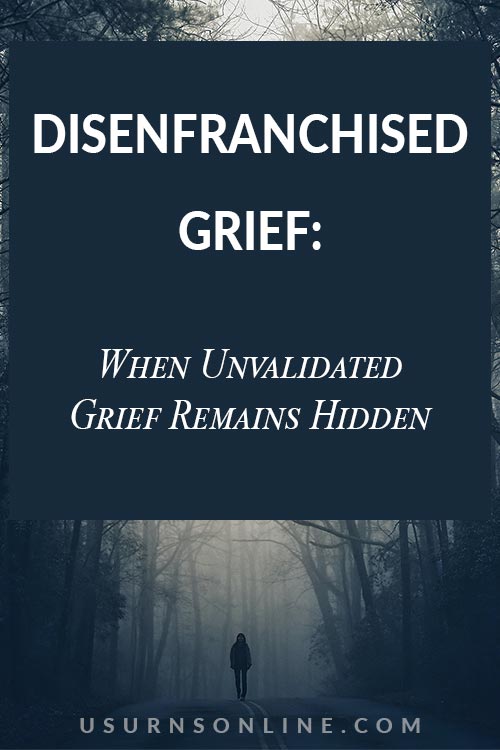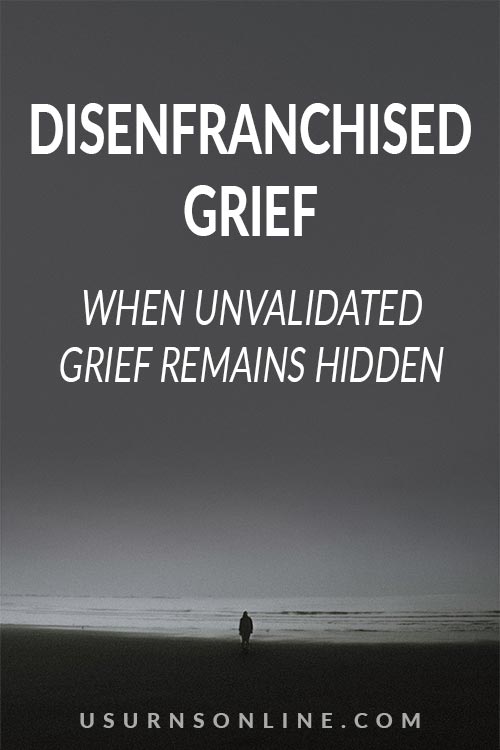Disenfranchised grief refers to any grief that goes unnoticed or unacknowledged by your family and friends, or by society at large. This type of grief also sometimes known as hidden grief or hidden sorrow.
Perhaps you feel like no one understands your grief or what you are going through. Or perhaps others think that you shouldn’t be as affected by the loss because you’re not, for example, a relative or spouse.
Plus, disenfranchised grief doesn’t always surface due to the death of a loved one. As with all varieties of grief, it can revolve around any type of loss you may be going through.
What Is Disenfranchised Grief?
Disenfranchised grief is when you mourn a loss that is significant to you, but your grief is deemed irregular or unwarranted by those around you.
There are times that others will judge the circumstances of your loss. This may leave you feeling alone. In this case, your grief is unvalidated and thus disenfranchised.
Ken Doka coined the phrase “disenfranchised grief” about thirty years ago. This is how he defines it: “Grief that person’s experience when they incur a loss that is not or cannot be openly acknowledged, socially sanctioned or publicly mourned.”

Why is disenfranchised grief also called hidden grief?
This is a grief that society doesn’t deem worthy of acknowledging. Often swept under the rug, disenfranchised grief can become crippling if not properly addressed.
Please continue to read on and learn some examples and causes of disenfranchised grief. If you see yourself or someone you know on this list, share your new knowledge, or absorb it yourself.
What are some disenfranchised grief examples?
The examples of disenfranchised grief are lengthy but worth the time of getting familiar with.
- Loss of a pet
- Death of a person you haven’t been in touch with for years
- Death of an online or “virtual” friend
- Feeling of abandonment by friends or family
- Not having a stable relationship with parents or siblings.
- Divorce
- Death of an ex (spouse, girlfriend/boyfriend, etc.)
- Death or loss of a non-public romantic relationship
- Loss of physical health (especially chronic “invisible” illnesses)
- Grieving someone who is still living. (Alzheimer’s or dementia patient, or a terminal diagnosis; this is known as anticipatory grief)
- Abortion
- Miscarriage or stillbirth
- Suicide
- A run-away or a missing person
- Death of the same-sex partner or any LGBTQ+ persons
- Death of a drunk driver in a car accident, or anyone that has been the cause of an accident
- Loss of life by homicide
- An adoption that doesn’t go through
- A dream that will never come to fruition
The list goes on and on. Disenfranchised grief may encompass so many relationships and situations.
Urns Made in the USA
Do I have the right to grieve this person?
It is absolutely normal to grieve anyone you had a relationship with. It is even normal to grieve someone you have never met. Permit yourself to grieve, to feel bad. Grief honors whatever or whoever it is that you are grieving.
Remember these very public deaths? The world grieved right along with you. This is known as collective grief:
- All of the mass shootings the world has suffered
- 9/11 terrorist attacks
- The death of Robin Williams to suicide
- The death of Kobe Bryant and his daughter Alyssa in a helicopter crash
- Other famous deaths: JFK, Princess Diana, Michael Jackson, Steve Irwin and more
- Wildfires that are devastating people’s and animal’s lives all over the world.
Feeling hurt for people going through a difficult time is natural. You can feel for a country that has been under attack, a horrific accident, earthquakes, fire, and yes, even suicide.
Other communal griefs might include death of a community member (local politician, pastor, niche social media icon, sports coach, teacher, online gamer, etc) or a loss in the workplace.
What are some ways that grief is unvalidated?
No matter what type of loss you have suffered, your grief is valid. In some cases, society just doesn’t recognize your grief. This makes the experience all the more difficult because you feel alone and that you can’t express it or talk to anyone about it.
The ways you might experience disenfranchisement include:
- Minimalization of your grief by friends and family
- Comments that you are “too sad” over the loss of a beloved pet
- You might be showing anger instead of sadness
- Your loss didn’t involve death, so it is considered less significant (loss of possessions, health, relationships, dreams, jobs, etc.)
- Crying too many tears or not enough tears
What is the difference between complicated grief and disenfranchised grief?
Complicated grief is traumatic or prolonged and can come if the death is sudden or grim. For example, complicated grief will often affect adults when it involves the loss of a child or spouse. In these times your family and friends will recognize and validate your grief, and will readily support you.
Disenfranchised grief, as mentioned earlier, is not acknowledged the same way. Friends and family may not understand why you are grieving over this loss. It may feel like you are being told your grief is insignificant, and you should be mourning alone. You won’t have the support that you deserve.
Ten Things You Should Know About Disenfranchised Grief
Here are some thoughts and comments that will help you better understand and cope with hidden grief.
1. Disenfranchised grief is a type of ambiguous loss.
Others may not understand the significance of your loss. You may have lost an ex-spouse, a step-child, or even a pet. This is a loss that occurs without closure. It can delay the process of working through your grief.
Related: Everything to Know About Ambiguous Loss
2. You don’t have the support from the ones closest to you.
If you don’t get support, you may feel like you have to hide your grief from those around you. You don’t want to make them feel uncomfortable, so you hold it inside. This is not the ideal way to process grief, but you feel like you have no other option.
3. Disenfranchised grief may develop into complicated grief.
By “hiding” this grief, you are opening yourself up to developing clinical depression, eating disorders, sleep disorders, or even suicidal thoughts. Working through your grief is imperative to your health.
4. There is counseling for disenfranchised grief.
Defining grief is easy. It is the loss of anything that you valued or loved. Counseling is always available to you. Finding a counselor that specializes in disenfranchised grief might be the perfect solution.
It is important to find a counselor who understands you and acknowledges your feelings. There are many wonderful trained professionals who chose their career path to help people just like you. Your counselor is out there, just waiting for you to find them.
5. Disenfranchised grief seems to show up in five ways.
This type of grief will develop when the loss is…
- Considered less significant. (Loss of possessions or loss of home country)
- Surrounded by stigma. (Abortion or suicide)
- Involving a concealed relationship. (Friends with benefits, same-sex partners, or extra-marital affairs)
- Excluded because other families/family members have precedence. (Loss of a best friend or an ex-spouse)
- Expressed in ways that don’t conform to society’s rules. (You should cry more, stay home, take time off work. Instead, you are doing the opposite.)
6. Grief will generally progress through stages.
You will usually be able to work through your grief in stages. If you aren’t allowed to show your grief, it will be harder to overcome it. It would help if you had the freedom to be able to grieve your loss.
Permit yourself to mourn, regardless of what people around you may be saying.
7. How disenfranchised grief may affect your health.
Not only will you likely experience the symptoms of so-called normal grief, but you may also develop:
- Insomnia
- High blood pressure
- Eating disorders
- Anxiety
- Depression
- Shame
- Muscle soreness and cramping
- Digestive issues
These are all treatable issues. Please seek help for your physical or mental symptoms.
8. You can ask your friends and family for what you need.
Let’s be honest; it’s hard to know what everyone needs if they don’t let their feelings be known. Share with people you can trust. You may surprised to find support where you expected none.
- Can you keep me company tonight?
- I don’t want to be alone right now, join me for dinner.
- I need to talk about this. Would you be my sounding board?
9. Examples of disenfranchised grief vary from person to person.
Nobody will grieve the same as you. Respect each other’s ways of grieving.
Genuinely, there is no right or wrong way to grieve. It is such a personal issue. Some people will cry and wail their grief for all to see; some will sit silently and suffer within themselves. Nobody’s grief is less significant than anyone else’s.
The way you mourn is your journey. It would be best if you didn’t let anyone convince you otherwise.
Learn more: How to Grieve Well (Or Poorly, For That Matter)
10. Give yourself space.
Stay away from people that don’t validate or acknowledge your grief. People like this will only add to your sorrow. It would be best if you took care of yourself. You matter.
This is one of the few times in your life when it is perfectly acceptable to be “selfish.” Take time to process and heal. Take care of yourself.
Learn about Other Types of Grief
I think a lot of people assume grief is just plain old grief. But that couldn’t be further from the truth. Disenfranchised grief is just one of many types of grief. There are nuances to how people process a loss, and more types of grief are being recognized by psychologists.
These include:
- Normal and complicated grief
- Anticipatory grief
- Resolved and unresolved grief
- Masked grief
- Cumulative grief
- Distorted grief
- Exaggerated grief
- Abbreviated grief
- Collective grief
- Secondary losses in grief
- Absent grief
- Chronic grief
Learn more about each type of grief. Each of these are different, yet can have similar symptoms. The emotion of grief is natural and shouldn’t be subdued. Allow yourself to grieve, and you will be healthier for it.





